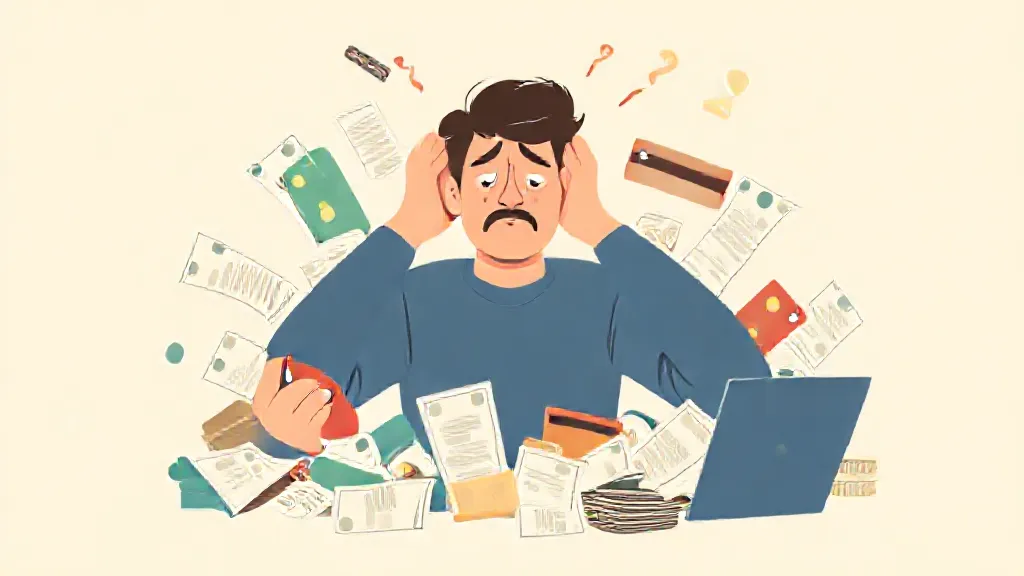Credit card debt has become a pervasive issue affecting millions of individuals across the globe. This type of debt is often characterized by high-interest rates, making it particularly challenging to manage and pay off. One of the primary reasons credit card debt is so hard to overcome is the compounding interest that accrues on outstanding balances.
Unlike other forms of debt, such as mortgages or student loans, credit card interest rates can be exorbitantly high, sometimes exceeding 20% annually. This means that even small balances can balloon rapidly, making repayment feel insurmountable.
The Psychological Impact of Credit Card Debt
Beyond the financial implications, credit card debt also has significant psychological effects on individuals.
The stress associated with owing money can lead to anxiety, depression, and a sense of hopelessness. Many people find themselves trapped in a cycle of debt, where they rely on credit cards for everyday expenses, further exacerbating their financial situation. This psychological burden can deter individuals from taking proactive steps to address their debt, as they may feel overwhelmed or embarrassed about their financial status.
The Temptation of Easy Credit
Another contributing factor to the difficulty in overcoming credit card debt is the accessibility of credit. Credit cards are marketed as a convenient solution for purchases, and many consumers are lured into a false sense of security by the ease of obtaining credit. This can lead to impulsive spending, where individuals purchase items they cannot afford, believing they can pay off the balance later.
The ease of swiping a card can diminish the perception of spending, leading to a lack of awareness about how quickly debt can accumulate.
The Minimum Payment Trap
Credit card companies often encourage consumers to make only the minimum payments on their balances. While this may seem manageable in the short term, it can lead to a prolonged repayment period that stretches over years, if not decades.
For instance, if someone has a balance of $5,000 with an interest rate of 18% and only pays the minimum, they could end up paying thousands of dollars in interest alone before the debt is cleared. This minimum payment trap can create a false sense of progress, as individuals believe they are making headway when, in reality, they are barely scratching the surface of their debt.
Lack of Financial Literacy
A significant barrier to overcoming credit card debt is the lack of financial literacy among consumers.
Many individuals do not fully understand how interest rates work, the implications of carrying a balance, or the long-term effects of debt on their financial health. Without this knowledge, it can be challenging for individuals to make informed decisions about their spending and repayment strategies. Educational resources on personal finance are crucial in empowering consumers to take control of their financial situations.
The Role of Economic Factors
Economic factors also play a role in the struggle with credit card debt. During economic downturns, individuals may face job loss, reduced working hours, or increased living expenses, forcing them to rely on credit cards to make ends meet. This reliance can lead to a vicious cycle where individuals accumulate more debt in an attempt to cope with financial hardships.
Moreover, inflation can erode purchasing power, making it more difficult for consumers to pay off existing debts while managing new expenses.
The Importance of Budgeting and Planning
To overcome credit card debt, effective budgeting and financial planning are essential. Individuals should create a realistic budget that accounts for all income and expenses, allowing them to allocate funds specifically for debt repayment.
Strategies such as the snowball method, where individuals pay off the smallest debts first, or the avalanche method, which focuses on debts with the highest interest rates, can be effective in reducing overall debt. Additionally, seeking professional financial advice can provide valuable insights and strategies tailored to individual circumstances.
Seeking Help: Debt Counseling and Consolidation
For those struggling to manage credit card debt, seeking help from debt counseling services or considering debt consolidation options can be beneficial.
Debt counselors can assist individuals in creating a manageable repayment plan and provide education on financial management. Debt consolidation, which involves combining multiple debts into a single loan with a lower interest rate, can simplify payments and reduce the overall interest burden. However, it is essential to approach these options with caution and to understand the terms and potential impacts on credit scores.
Conclusion: Taking Control of Credit Card Debt
In conclusion, overcoming credit card debt is a multifaceted challenge influenced by psychological, economic, and educational factors. Understanding the complexities of credit card debt is the first step toward effective management. By prioritizing financial literacy, creating structured repayment plans, and seeking assistance when needed, individuals can take control of their financial futures and work toward a debt-free life.
